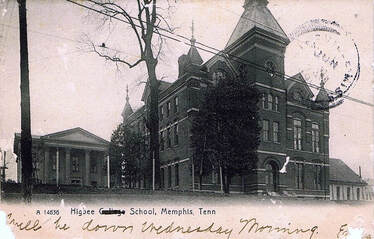
By M.P. Pellicer | Stranger Than Fiction Stories
In the winter of 1892, a gruesome murder was committed in public by a young woman, a graduate of the Higbee School for Young Ladies, where butchery was not on their curriculum. 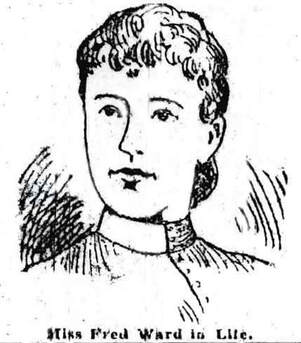 Frederica Ward (1874-1892) Frederica Ward (1874-1892)
January 1892, Memphis, Tennessee
The city of Memphis was rocked by a scandalous murder that took place in daytime, in full view of various witnesses. There was no mystery as to who committed the crime, but the reason for the killing, caused tongues to wag for years. Alice Mitchell murdered her former friend Frederica "Freda" Ward, almost beheading her with a razor. The motive, as freely admitted by her, was because she wanted to marry Freda. She preferred to see her dead rather than be deprived of her love. Alice wounded Frederica's sister Jo who was present during the crime, and tried to intervene. Lillie Johnson who rode with Alice Mitchell in the buggy and waited while the murder was committed, was also arrested. Freda was 17, and Alice was 19 years old. From the beginning it was assumed Alice Mitchell was insane. "Even though she was rational in other respects she was a slave to an abnormal passion." Others believed the crime was the act of a sane but morbidly sensitive woman with a violent, vindictive temper. 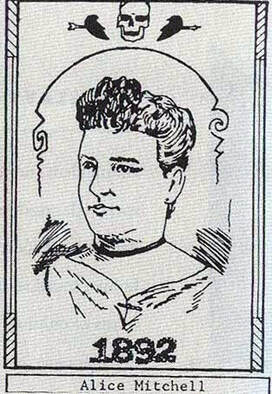 Alice Mitchell (1872-1898) Alice Mitchell (1872-1898)
People who knew Alice since childhood believed she was mentally unbalanced. She was affectionate only towards females, especially the one she killed. Alice was described as indifferent to everybody even members of her family. She learned slowly at school and was not of the mental age of her years. She was an expert shot with a rifle, and amused herself by shooting sparrows in her back yard. Another pastime was to ride a horse bareback around the premises.
Alice Mitchell's crime deeply embarrassed her parents since she was the daughter of one of the oldest and wealthiest families in the city, who up to that moment had an untarnished reputation. Alice's father George Mitchell was involved with the firm Mitchell & Bryson, furniture dealers. She was the youngest of six children. The other girls who were attacked were of poorer parentage, but highly respectable. 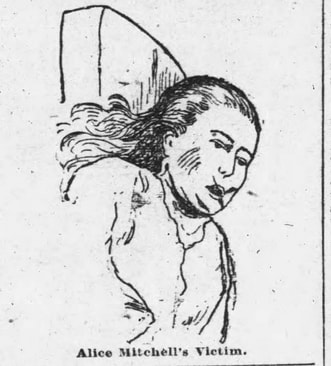 Illustration of Frederica Ward's body at the inquest with all her wounds c.1892 Illustration of Frederica Ward's body at the inquest with all her wounds c.1892
Alice, Freda and Lillie had met at the Higbee School, which was a fashionable girl's school in the city. The catalyst for the murder was when Freda's married sister Ada, discovered letters in June 1891, that described Alice's obsession with Freda. She forbade Freda to write or speak to Alice.
Ada then wrote a letter to Alice's mother and called the attachment abnormal. Part of what Ada had discovered was that Alice tried to persuade Freda to run away with her, saying she wanted to marry her. Fredericka Ward's mother had died when she was 8 years old, and she and her sister Jo lived with their sister Ada Volkmar for the last two years at Golddust, Tennessee. Obedient to her older sister, Freda cut off all contact with Alice for six months. The Ward sisters had been visiting friends in Memphis, and intended to go home to Golddust on the steamer Ora Lee. They were with a friend Christina Purnell, and as they crossed Front Street at Madison, a buggy occupied by Alice Mitchell, Lillie Johnson and her nephew Thomas Maier, 6, drove up to the custom-house. Alice Mitchell got out of the buggy and followed the trio. When they were half way between Front Street and the railroad tracks near the levee on the ice-covered walk, Mitchell overtook them and drawing a razor slashed Frederica. Jo Ward tried to intervene and screamed, "you shan't hurt my sister" and struck Alice Mitchell with her umbrella knocking her down. The murderess recovered and after one sweep with her razor at Jo Ward, wounded her on the left breast. Then she turned back to Frederica who was running toward the river with blood streaming from several wounds in the face. It was theorized that she thought if she could reach the steamboats on the levee she would be safe. However she forgot the slippery condition of the walk, and when she reached the end of walk she turned to find Alice Mitchell close upon her with the bloody razor. Realizing she couldn't make it to the boats, she headed towards a railroad flagman who was standing with his back to the girls watching a train. Before she reached him, Mitchell reached her and grasping her with her left hand threw her head back and cut her throat, through the socket of one jaw bone to the other, severing the jugular vein, carotid artery, windpipe and esophagus. 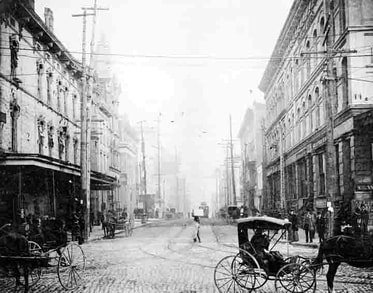 Madison and Front Streets, Memphis, c.1890 Madison and Front Streets, Memphis, c.1890
Alice Mitchell ran back up the hill and when she made it to the buggy, said quietly, "I've done it." Then she got in, seized the reins striking the horse savagely with the whip, and driving rapidly on Front Street to Court Street. She went to her home at 215 Union Street.
The dying girl was put into a wagon, which was driven to Dr. Roger's office, however by the time they arrived she had died. Jo Ward was attended by Dr. Klyee which dressed her wounds. Right after, an inquest was held on the second floor of Stanton & Hinton's undertakers. Besides the cut to Freda's throat there were four large cuts on the face and neck and two small ones. The first large cut was on the left cheek, which had been slashed to the bone; another made a gaping wound in the chin, another had split her upper lip and the fourth was the slash to the throat, literally from ear to ear. Jo Ward testified at the inquest that when Alice Mitchell was attacking her sister she said, "I want to die anyhow!" She said that she didn't know a reason for the attack, except that her sister wouldn't go to see Alice, and if they met on the street they wouldn't speak to her. 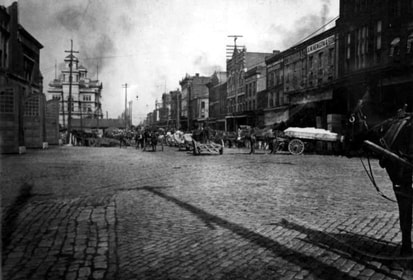 Cobblestones of Front Street with the Customs House and a firehouse on left c.1890s Cobblestones of Front Street with the Customs House and a firehouse on left c.1890s
Police Chief Davis and Sergeant Ed Kehoe went to the Mitchell resident to make an arrest about 30 minutes after the tragedy.
Alice did not exhibit the least emotion when she was called downstairs to meet the the police chief. "Her face and movements denoted sullen resignation." She was listless and careless and said nothing only saying to wait for her father to arrive before taking her away. Mitchell wore a black veil that completely concealed her features when taken into the police headquarters, accompanied by her father. A reporter from the Appeal-Avalanche interviewed her, and her statement agreed in everything that Lillie Johnson had told the same reporter about what happened. She seemed to find satisfaction in talking, and expressed no remorse and that she had done nothing monstrous. She said she couldn't bear to be parted from Freda, and killed her because she loved her so well. She had used a razor taken from her father's shaving case. She shed tears when she talked about having parted with Frederica, but there was no emotion when she described how she killed her. 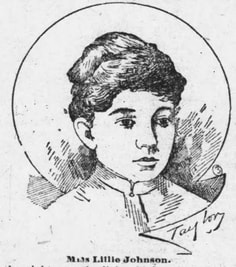 Lillie Johnson c.1892 Lillie Johnson c.1892
Lillie Johnson told a reporter that she had stayed at the buggy with her 6-year-old nephew, after Alice Mitchell got off. Five minutes later Alice came running towards the buggy. Her hands and dress were bloody. When she asked what happened, Alice Mitchell said, "I have cut Fred's throat. I don't know if I killed her or not, but I loved her so, I couldn't help it."
She described that Alice whipped the horse, and drove off at a great speed. Lillie told Alice that she had blood on her face. She said, "Don't wipe it off, it's Fred's blood, and you know how much I loved her." She said that when Alice Mitchell arrived at her home, she went upstairs and told her mother of having cut Freda's throat. Lillie Johnson told the reporter: I have known of the infatuation Allie felt for Fred for some time. She confided to me her feelings, and has often told me she wanted to marry Fred. I thought this remark very strange and told her that one woman could not marry another woman. She would say, 'Then I won't marry anyone!' She seemed completely wrapped up in her attachment for Fred. They were chums for two or three years and their close friendship remained unbroken until last June when Mrs. Volkmar, Fredericka's older sister wrote a letter to Allie's mother and broke the intimacy that existed between them. From that time Allie was a changed girl. She seemed to be brooding over the estrangement. I would frequently be talking to her and ask questions on commonplace matters and get no response, and when I would remind her of my questions she would answer, 'Yes, I hear you, but I am thinking of Fred. I can't live without her.' It was a few days after her mother received the letter from Mrs. Volkmar at Golddust that Allie came to me and said 'I have been deceived.'" 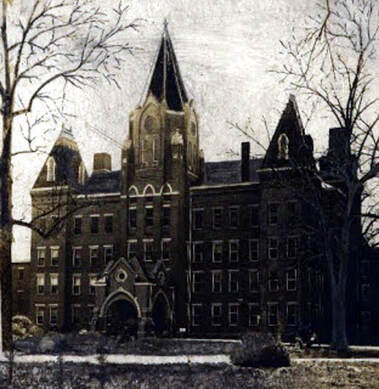 Western State Hospital for the Insane in Bolivar, TN. c.1900 Western State Hospital for the Insane in Bolivar, TN. c.1900
Lillie described where things got worse when two weeks later, when a letter she had written to Frederica was returned unopened. She said that Alice was jealous of Freda's men friends.
Lillie Johnson was arrested since it was believed she knew of Alice Mitchell's plan, and had not tried to stop it. Mr. Mitchell and Mr. Johnson took quarters in the jail to be near their daughters, who shared the same cell. After two days' deliberation the grand jury indicted both for murder with malice and premeditation. Both pleaded not guilty, but Alice's attorney entered an additional plea of present insanity. George Mitchell, Alice's father hired the best attorneys money could buy. He hired former secretary of war and ambassador to Japan Gen. Luke E. Wright and Col. George Gantt. Lillie Johnson was represented by her neighbor Malcolm Patterson, an unknown lawyer then, but later he was elected to Congress in 1900, and governor in 1907. The prosecutor was Atty. Gen. George B. Peters Jr. who had handled prosecution of cases in the area of murder, sexual transgression and insanity. He had his own tinge of scandal attached to his family, when his father Dr. George Peters had murdered Confederate General Earl Van Dorn in 1863, when he caught the general with Mrs. Peters. Sarah Bernhardt who was appearing in Memphis at the time of the crime visited Alice in jail, and struck up a friendship with Alice. It's unknown why she would feel affinity towards such a heinous murderess. 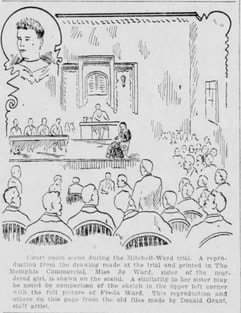 Courtroom scene from the Mitchell-Ward trial c.1892 Courtroom scene from the Mitchell-Ward trial c.1892
Alice Mitchell was taken to the Western State Hospital for the Insane in Bolivar, to verify if she was a lunatic, or to find her sane and have her face trial.
By February, Alice Mitchell's family was trying to find proof of a family lineage for lunacy. Her mother, Isabella Mitchell née Scott married George Mitchell in 1856 and had 7 children before the birth of Alice when she was 44 years old. She had been treated for "puerperal insanity" after the birth of her first child and its subsequent death, and was treated for dementia in an asylum in Ohio after Alice's birth. She never appeared in the courtroom during the proceedings. They also claimed that a sister and an uncle of Mrs. Mitchell's were also confined in an asylum. Her sisters Mattie and Addie testified that about the age of 12, Alice showed signs of nervousness and preferred boyish behavior. While they were still friends, Frederica had become engaged to Ashley Rozell (Rosell), but Alice took laudanum in an attempt at suicide, and Freda broke off the engagement. When Frederica moved to Golddust in 1891, they sent letters to each other using assumed names. Part of their letters was in a cypher they had worked out. During the trial it came out that Alice planned to cut her hair, dress as a man and use the name of Alvin J. Ward. If Alice's pastor at Grace Church wouldn't perform the ceremony they would run away to St. Louis. Once on the stand, Alice was asked: "Why did you follow her?" "To cut her." "Why did you cut her?" "Because I knew I could not have her and I didn't want anyone else to have her." "You intended to kill her?" "Yes" "Why?" "Because I could not have her." 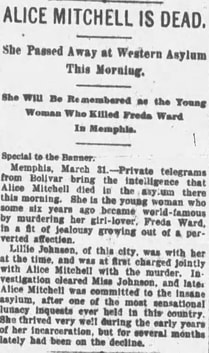 The death of Alice Mitchell c.1898 The death of Alice Mitchell c.1898
In July 1892, Alice was adjudged insane, and was committed to Bolivar asylum. Her family paid for all her comforts. It was noted she practiced the French harp, and was seen reading The Woman in Black by a reporter who visited her in the asylum. She had also put on 20 pounds. She would attend all the dances held for the patients, and appeared to be very gay. She never referred to Freda or the murder.
Freda's brother-in-law said of Alice: "She is a bad girl. She committed the murder at the dictate of a cold, wicked heart. ... She was no more crazy than I am." A rhyme was made up for Alice: There goes that Alice Mitchell With arms strong tightly bound down. For the crime she did in Memphis, She's bound for Bolivar now. It wasn't until March 1893, that the case against Lillie Johnson was dismissed. At that time she was suffering from consumption, and it was believed she wouldn't last a year. This appeared to be exaggerated in order to gain sympathy since Lillie was still alive in 1930. Alice died unexpectedly in 1898, at the age of 25. Upon her death, it was said she had died from tuberculosis, but those closest to the case said she had taken her own life by jumping into a water tank at the top of the asylum building. Freda's grave was unmarked except by flowers for many years. Both of them are buried in Elmwood Cemetery in Memphis. RELATED STORY
0 Comments
Your comment will be posted after it is approved.
Leave a Reply. |
Stranger Than Fiction StoriesM.P. PellicerAuthor, Narrator and Producer Archives
July 2024
Categories
All
|
Stories of the Supernatural
- Stories of the Supernatural
- Miami Ghost Chronicles
- M.P. Pellicer | Author
- Stranger Than Fiction Stories
- Eerie News
- Supernatural Storytime
-
Astrology Today
- Tarot
- Horoscope
- Zodiac
-
Haunted Places
- Animal Hauntings
- Belleview Biltmore Hotel
- Bobby Mackey's Honky Tonk
- Brookdale Lodge
- Chacachacare Island
- Coral Castle
- Drayton Hall Plantation
- Jonathan Dickinson State Park
- Kreischer Mansion
- Miami Biltmore Hotel
- Miami Forgotten Properties
- Myrtles Plantation
- Pinewood Cemetery
- Rolling Hills Asylum
- St. Ann's Retreat
- Stranahan Cromartie House
- The Devil Tree
- Trans-Allegheny Lunatic Asylum
- West Virginia Penitentiary
- Paranormal Podcasts
"When misguided public opinion honors what is despicable and despises what is honorable, punishes virtue and rewards vice, encourages what is harmful and discourages what is useful, applauds falsehood and smothers truth under indifference or insult, a nation turns its back on progress and can be restored only by the terrible lessons of catastrophe."
- Frederic Bastiat
- Frederic Bastiat

Copyright © 2009-2024 Eleventh Hour LLC. All Rights Reserved ®
DISCLAIMER
DISCLAIMER
 RSS Feed
RSS Feed
















